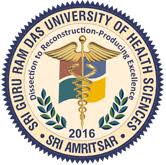General Information
Sri Guru Ram Das University of Health Sciences (SGRDUHS), located in Amritsar, Punjab, operates as a State Private University. It was established in 2016 under the Punjab Private University Policy, evolving from the long-standing Sri Guru Ram Das Institute of Medical Sciences & Research, which itself dates back to 1997. The university is run under the aegis of the Shiromani Gurdwara Parbandhak Committee (SGPC), Amritsar, reflecting a deep commitment to service and healthcare accessibility, inspired by Sikh values.
Its core mission is firmly centered on providing high-quality medical and health sciences education, fostering research, and delivering compassionate patient care, particularly serving the community in Punjab and neighboring regions.
Key Recognitions:
Established by a State Act and recognized by the University Grants Commission (UGC).
Holds necessary approvals from key professional bodies: NMC (Medical - for the constituent SGRDIMSAR), DCI (Dental), INC (Nursing).
Accredited by the National Assessment and Accreditation Council (NAAC) with an 'A' Grade.
MCI Recogination
Recognized for 50 seats. Recognized for increase of seats from 50 to 100 seats. Recognized for increase of seats from 100 to 150 seats when degree granted on or after December, 2017. Continuation of Recognition granted for one (01) year for 2022-23 only. Permitted for admission for 2023-24. Annual renewal permission granted for 150 MBBS seats for AY 2024-25
Campus Facilities
The Campus: Integrated Health Hub in Amritsar
SGRDUHS operates from a well-established and integrated campus.
Location: Situated at Mehta Road, Vallah, Sri Amritsar, Punjab.
Campus Vibe: Expect a large campus dedicated to health sciences, seamlessly blending academic buildings (Medical, Dental, Nursing colleges) with its extensive hospital facilities. The atmosphere is professional, focused on clinical training and patient care, infused with the service ethos of its managing body.
Infrastructure & Facilities:
Constituent Institutes: Dedicated modern buildings house the Sri Guru Ram Das Institute of Medical Sciences & Research (SGRDIMSAR), Sri Guru Ram Das Institute of Dental Sciences & Research, Sri Guru Ram Das College of Nursing, etc.
Learning Resources: Well-stocked central and departmental libraries focused on medical, dental, and nursing literature, with access to digital resources and e-journals.
Advanced Laboratories: State-of-the-art labs supporting pre-clinical and para-clinical medical education, dental labs, nursing skills labs, simulation centers, and research facilities.
Hospital Integration: Direct and functional integration between academic areas and the Sri Guru Ram Das Charitable Hospital.
Learning Spaces: Air-conditioned lecture theatres, demonstration rooms, seminar halls equipped with modern A/V aids.
Residential Facilities: Extensive hostel accommodation for students, residents, and nursing staff.
Amenities: Food courts/canteens, banking facilities (ATM), transportation services, sports facilities, administrative offices, and potentially a Gurudwara within the campus.
Hospital & Medical Facilities
Leading tertiary care hospital attached to the institution
Healthcare Core: Sri Guru Ram Das Charitable Hospital
The teaching hospital is the heart of SGRDUHS, embodying its service mission.
Flagship Hospital: Yes, the university runs the large Sri Guru Ram Das Charitable Hospital as its primary teaching hospital, located within the campus.
Scale & Services: This is a major tertiary care hospital serving a large population. Key features include:
Capacity: A very substantial bed capacity (check current figures, often reported as 1000+ beds).
Services: Offers comprehensive healthcare across almost all major medical and surgical specialties and several super-specialties. It features 24x7 Emergency & Trauma care, advanced Critical Care units (ICUs, NICU), modern Operation Theatre complexes, advanced diagnostic services (Radiology including MRI/CT, well-equipped Labs), a Blood Bank, Pharmacy, Dialysis unit, and handles a high volume of OPD and IPD patients.
Dental Hospital: The associated Sri Guru Ram Das Institute of Dental Sciences & Research operates its own comprehensive dental hospital.
Charitable Aspect: The hospital often provides subsidized or free treatment to needy patients, reflecting the SGPC's service mandate, which also provides diverse clinical exposure for students.
Educational Engine: The SGRD Charitable Hospital and the Dental Hospital are the core clinical training grounds for SGRDUHS students in MBBS, MD/MS, BDS, MDS, Nursing, and Allied Health programs, offering extensive hands-on experience in a high-volume setting.
Fee Structure
State University Affordability
Fee Structure: Reflecting Private Status in Punjab
As a private university (though managed by a charitable trust), SGRDUHS's fees are significant, particularly for clinical courses, and are regulated by the Punjab state government/Baba Farid University of Health Sciences (BFUHS) which typically conducts the state counselling.
City Details
Hostel & Mess
Campus Living: Comprehensive Hostel Facilities
On-campus residence is standard, especially for medical and nursing students.
Accommodation: SGRDUHS provides separate, well-secured hostel blocks for boys and girls, residents, and nursing students within the campus. Various room types (AC/Non-AC, sharing configurations) are likely offered.
Amenities: Hostels are generally well-maintained, providing essential furniture, 24/7 security, power backup, common rooms, potentially Wi-Fi, study areas, laundry services (paid), housekeeping, and warden supervision. Easy access to the hospital for clinical duties and emergencies.
Dining: Dedicated mess halls serve hygienic meals, often including Punjabi cuisine alongside other options, catering to the large student body. Vegetarian options are standard.
Cost: Hostel and mess fees represent a significant additional annual expense. For a private medical university, expect this combined cost to likely fall in the range of ₹1,20,000 to ₹2,00,000 or more per year, depending on AC/Non-AC, room sharing, and amenities. Confirm the exact charges during admission.
Miscellaneous
Admissions & Career Pathways: NEET-Driven Process
Getting Admitted:
MBBS / BDS / MD / MS / MDS: Admission is strictly and exclusively based on qualifying ranks in NEET-UG or NEET-PG/MDS.
State Counselling is Mandatory (Punjab): Seat allotment for all categories (Govt Quota - Punjab Domicile, Management Quota - Open Merit, NRI Quota) is handled entirely through the Punjab State NEET Counselling process, which is conducted by Baba Farid University of Health Sciences (BFUHS), Faridkot. Candidates must register for BFUHS counselling and select SGRDUHS/SGRDIMSAR under the appropriate quota. Allotment depends solely on NEET rank, category, and filled choices according to state rules.
Nursing / Physiotherapy / Allied Health: Admission procedures usually involve state-level entrance tests (like PPMET for B.Sc Nursing conducted by BFUHS) or might be based on merit in the qualifying examination (Class 12) through university-level applications/counselling coordinated under BFUHS/state guidelines. Check SGRDUHS/BFUHS specific admission notifications.
Career Path:
Clinical Graduates (MBBS/MD/MS etc.): The standard path involves completing the mandatory internship (stipends usually paid), then pursuing PG specialization (via NEET-PG/MDS), joining hospitals (including potentially SGRD Hospital), government service (if applicable), or private practice.
Nursing/Allied Health/Therapy Graduates: The university likely has a placement cell focusing on these streams. Given the integrated hospital and university's reputation, graduates are well-positioned for recruitment in SGRD Hospital, other major hospital chains (especially in North India), diagnostic centers, and rehabilitation units. Placement success depends on the course demand and individual student capabilities.
Information for NRI Candidates
Punjab's private medical and dental colleges, including SGRDUHS, have specific provisions for NRI admissions.
Collage Images Gallery
Facilities & Campus Life
Well-equipped Library
Experienced Faculty
Computer Lab
Sports Activities
Heritage Campus
Frequently Asked Questions
Why Consult With Us?
- 15+ years of experience in medical education counseling
- 5000+ students successfully guided
- 50+ partner universities worldwide
- Free initial consultation with no obligation














